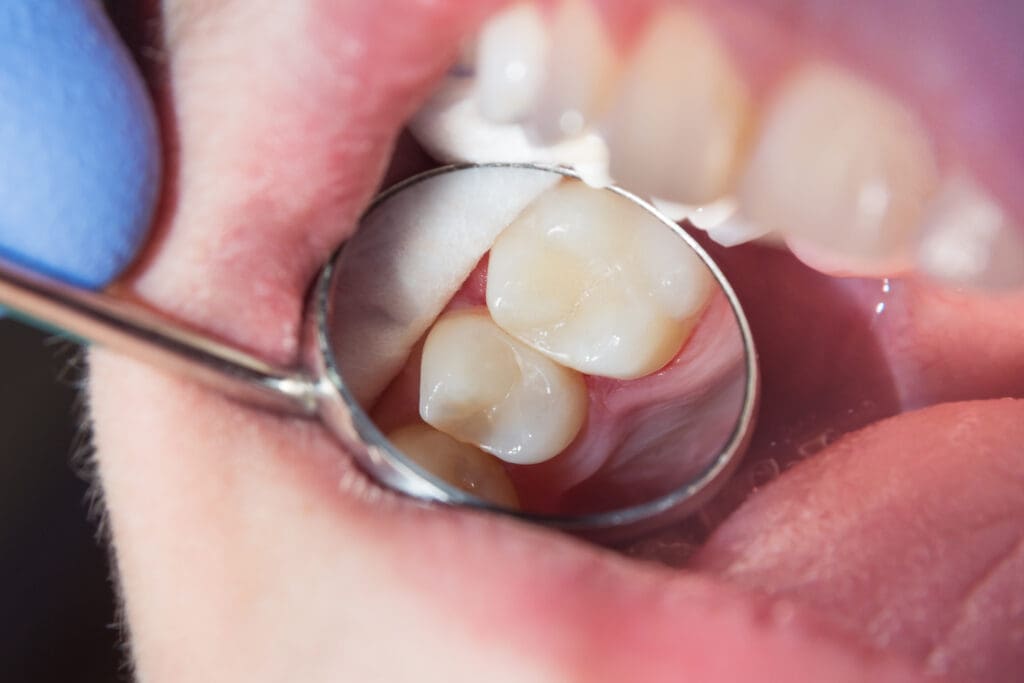Dr. Jason Petkevis is a family dentist in Chester Springs, PA. He has experience treating tooth cavities and other common dental concerns in children and adults. We provide Tooth-colored fillings for all ages in a caring and comfortable dentist office.

What Causes Tooth Cavities?
Tooth cavities, which dentists call dental caries, are, in essence, tooth decay. Most tooth cavities are caused by plaque buildup. When plaque comes in contact with sugar and starch, it activates bacteria in plaque. This process causes plaque to attack and erode tooth enamel. As the tooth enamel breaks down and wears away, it leaves the tooth susceptible to the formation of tooth cavities.
Tooth Cavity Symptoms
Your dentist in Chester Springs can identify cavities before you even experience symptoms. Any dentist can! So don’t assume they are only trying to get you to pay for more dental services. It is important to maintain regular dental check-ups at least twice a year. In the advanced stages of tooth decay, you might experience a toothache. Tooth pain from a cavity is more likely to happen after consuming sweet, hot, or cold foods and drinks. Other signs of tooth decay are visible pits or holes in your teeth.
Treatment For Tooth Cavities in Chester Springs, PA
If you have a tooth cavity or if your teeth are showing signs of decay, contact us today. Dr. Petkevis provides a number of general dentistry treatments to stabilize and protect affected teeth. Tooth-colored dental fillings are often used to treat teeth in the early stages of tooth decay.
Dental fillings can be placed in a single visit. They can last a lifetime with routine dental care. Other treatment options may include inlays, onlays, and dental crowns. For patients with advanced symptoms of tooth decay, a root canal may be required to bring the tooth to proper health. You may not need a root canal if you visit our dentist as soon as you experience tooth pain.
Patient Review
Dental Cavities FAQs
Read answers to common questions about cavities in our Chester Springs, PA, dental office:
Who is most at risk of getting dental cavities?
While children may be most susceptible to cavities, many other risk factors need to be considered. Geriatric patients with recessed gums and reduced salivary flow is another high risk population. People with high sugar and acidic diets will develop cavities more frequently. Patients with previous history of cavities may have high counts of the type of bacteria that causes dental decay. The best way to prevent is proper home care techniques and regimens, and regular visits to the dentist.
How do you treat cavities?
A dental filling can treat most tooth decay. However, if the cavity has gone too long without treatment, it may be too severe for a simple filling. In these cases, Dr. Petkevis must place a dental crown, inlay, or onlay. In both cases, the decayed portion of the tooth will be removed. Then, it will be treated with a filling, crown, inlay, or onlay to protect the tooth from further damage.
Does a tooth filling hurt?
To help manage the pain, Dr. Petkevis administers a local anesthetic around the tooth being treated. For most people, this is enough to eliminate any pain. However, you will feel pressure during the treatment while he works on the tooth.
After the numbing begins to fade, you may feel some tingling in your mouth and some minor sensitivity. This should fade in a few days. If you are experiencing any discomfort, you may take some over-the-counter pain relievers.
What happens if you don’t treat cavities?
If you do not treat a cavity, you can experience worsening symptoms of decay over time. You may experience more cavities and may even lose permanent teeth. Tooth abscesses can also form as bacteria spread throughout the mouth. Inflammation may negatively affect other parts of the body.
Do I need to remove a tooth with a cavity?
We may need to remove a tooth if the cavity is too large or the tooth is severely decayed. Otherwise, we will clean and fill the cavity. We will also provide a dental crown, inlay, or onlay to add a protective structure to the tooth. After an examination, we will determine if you need a dental extraction or if we can save your tooth.
How do you know when a dental cavity reaches the tooth’s nerve?
If you have a dental cavity, you will know that your cavity has reached the nerves if you experience:
- Severe chronic tooth pain
- Bad taste in the mouth
- Sensitivity to hot and cold
- Tooth discoloration (grey or darkened tooth)
Receive professional dental care as soon as you notice these symptoms. You may need a dental extraction to prevent the spread of infection.
Schedule a Dental Exam Visit
The best way to prevent tooth cavities is through regular visits to the dentist. Dr. Petkevis will examine your oral health and offer effective recommendations. Schedule an appointment with Chester Springs dentist Dr. Jason Petkevis for you and your family. Call us at (610) 400–1459 or schedule an appointment online today.
